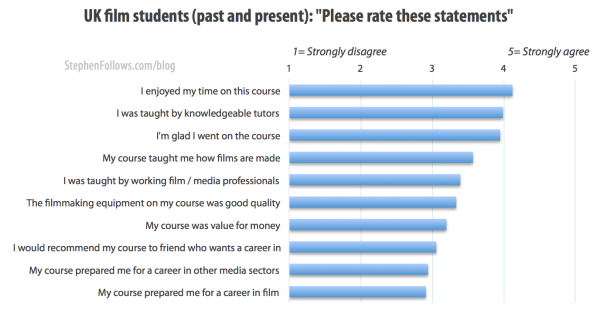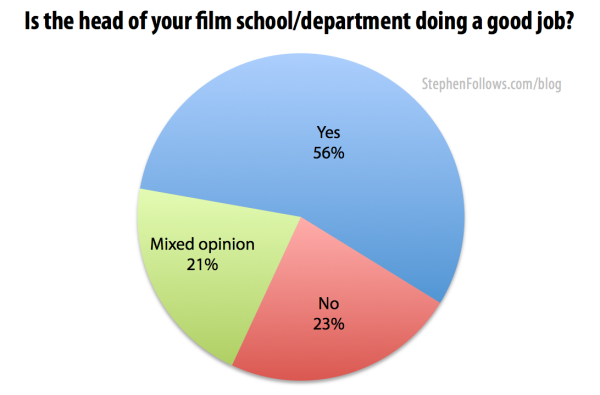 A few years ago I wrote a piece about the big increase in film students in the UK, showing how the number of UK film students grew by 240% between 2004 and 2012. Not only is the number of film students increasing, there is more of a focus towards practical film courses. Production-based courses rose by 589% 2004-12, meaning that by 2012 17% of the approximately 5,500 film students in the UK were studying ‘Film Production’ (as opposed to ‘Film Studies’).
A few years ago I wrote a piece about the big increase in film students in the UK, showing how the number of UK film students grew by 240% between 2004 and 2012. Not only is the number of film students increasing, there is more of a focus towards practical film courses. Production-based courses rose by 589% 2004-12, meaning that by 2012 17% of the approximately 5,500 film students in the UK were studying ‘Film Production’ (as opposed to ‘Film Studies’).
In the third installment of my film school study, I am giving voice to this growing cohort of film students. I surveyed 317 film students past and present and asked them an array of questions about their course, their school and their experiences. In summary…
- Film students seem to really enjoy their time studying film
- Students are not confident that their course has prepared them for a career in film
- Over a quarter of all students said they wanted an increase in awareness of industry practice
- Students on longer courses had more fun but were less confident that their course prepared them for employment in the industry
- Students want more practical study and more specialised modules
- 56% of students feel that their Head of School is doing a good job
- Film students and film employers have slightly different views on what makes a new entrant more employable.
- Students undervalued the significance of having a driving licence and overestimated the value of all other factors.
Film school is fun, but does it prepare you for a career in film?
I asked the film students to provide a rating between 1 and 5 for a number of simple statements. The highest scoring statement was “I enjoyed my time on this course”, scoring an average of 4.1 out of 5. The lowest scoring statement was “My course prepared me for a career in film”, receiving just 2.9 out of 5. 
Are long courses more fun? More use?
By splitting the results above by the length of the course we see some interesting results. Courses lasting three or more years were rated as…
- The most fun
- The least likely to be taught by film / media professionals
- The least likely to prepare students for a career in film (although the most likely to prepare them for other “media” professions).
This could be due to the fact that dedicated film schools tend to offer courses of between one and two years, whereas many universities offer courses of at least three years. As my previous research shows, film schools tend to be more focused on the employability of graduates within the film industry, while university courses tend to contain more theory-based work. 
“What could be done to improve your course?”
I gave the students space to provide ideas for how their course may be improved. Over a quarter of all students said they wanted an increased awareness of industry practice. Film graduates felt that their course had not prepared them for the realities of the industry, and this sentiment was also echoed by current film students who did not feel they were being prepared for employment. The second most suggested improvement was that students want a greater number of practical workshops, assessments and opportunities to create their own work. A significant portion of them explicitly stated that they felt they had been misled by the course outline in respect to the practical content of their course. The students that complained about the quality of teaching focused on four main areas…
- A lack of teachers with professional experience
- A lack of enthusiasm and engagement
- A lack of contact hours and access to teachers
- A lack of consistency due to a high turnover of staff
Many of these respondents suggested that the issue with teaching is not quality across the board but rather consistency of quality. Another general trend was that students want a greater number of specialised modules and greater control over the content of their courses and, in particular, the option to choose specific modules later on. This suggests that despite the huge number of courses being offered around the UK, students still struggle to find courses that they want. Only four students mentioned that the course should cost less, which is surprising given the large fees charged by many film schools. The most common themes within the comments were…
| Comments | % of responces |
|---|---|
| Increased awareness of industry practice | 25% |
| More practical content | 16% |
| Improve quality of teaching | 8% |
| More specialised modules on a particular area | 8% |
| Improved Course Structure | 7% |
| Offering help with a placement/ work experience | 7% |
What do film students think about the head of their school?
I asked the students about the heads of their school or department. Over half of respondents believe that their head is doing a good job.  The most common comment given in support of the head doing a good job was to note their positive personality traits or characteristics. These traits tended to be approachability, knowledge and hard-work. 31% of respondents suggested that close engagement with the running of the school is important and it was a common reason given for whether their head was doing a good job (i.e. closely involved) or bad job (i.e. distant and not involved). 35% of students suggested that industry/ practical knowledge, links and teaching are important. There were 20 occurrences of it being listed as a positive comment and 17 as a negative comment. In a number of cases, these complaints referred specifically to a lack of industry experience by the Head of School and the impact this was having on their studies. This was the case with academics at universities more regularly than with industry professionals at film schools. Common complaints from students were…
The most common comment given in support of the head doing a good job was to note their positive personality traits or characteristics. These traits tended to be approachability, knowledge and hard-work. 31% of respondents suggested that close engagement with the running of the school is important and it was a common reason given for whether their head was doing a good job (i.e. closely involved) or bad job (i.e. distant and not involved). 35% of students suggested that industry/ practical knowledge, links and teaching are important. There were 20 occurrences of it being listed as a positive comment and 17 as a negative comment. In a number of cases, these complaints referred specifically to a lack of industry experience by the Head of School and the impact this was having on their studies. This was the case with academics at universities more regularly than with industry professionals at film schools. Common complaints from students were…
- The head is not primarily focused on students
- Their primary focus is profit
- Conflict of interests or competition for time with the head’s personal and professional projects
Broadly-speaking, the students’ comments can be used to create two main types of head of school: academics and industry professionals. Each has their own drawbacks…
- Academics often lack industry/practical experience and students tend to feel this is reflected in the course content.
- Industry professionals have other projects and commitments which seem to supersede the school, and so the standard of teaching and their involvement in the school suffers.
Do film students know what’s need to get hired in film and TV?
Last summer I surveyed a large number of employers from within the film and TV industries. One of the questions I asked them was “How important are the following factors in deciding which candidate you employ”. I asked a very similar question to my film student respondents to see if the students have a clear idea of what will be required of them as new entrants. Overall, the film students undervalued the significance of having a driving licence and overestimated the value of all other factors.  It should be noted that the employers listed above are all UK employers, hence why speaking foreign languages is of little value to them. International employers rated it much higher, as I showed here.
It should be noted that the employers listed above are all UK employers, hence why speaking foreign languages is of little value to them. International employers rated it much higher, as I showed here.
Methodology
The survey of student opinions was performed with the help of Raindance, Talent Circle, Shooting People, My First Job in Film and Chris Jones. I am grateful to them for their support in helping me reach films students past and present. I also used targeted Facebook adverts to reach possible respondents. My survey included a total of 485 respondents, of which 270 were graduate film students and 48 were current film students. In this context, ‘film student’ refers to people on full-time film courses in the UK, lasting at least one year. I have not presented the findings from the remaining 167 non-film students / graduates in today’s article for reasons of space. In the future, I may write a piece on the difference in opinions on the film industry between students studying film and those studying non-film topics.
Notes and Caveats
It is worth bearing the following notes and caveats in mind when considering the data I am presenting today…
- Highly subjective. Today’s research is based on opinions, rather than objective fact, and so all of the findings should be read as such.
- Having enough information. As many students admit, they lack enough information on the role of the head (how much control they actually have, what decisions they are responsible for or not, etc). This means comments are often based on personal experiences of the head or simply speculation.
- There is no ‘typical’ film school. Today’s data covers a wide range of types of institution, ranging from Universities to Film Schools. These different institutions often have different leadership structures, so heads have very different requirements and constraints. As such, this data conflates two different types of head of school.
- Representative of students at large. It’s hard to know how representative the views of my respondents are of all film students. I surveyed 317 students, which equates to about 0.6% of the total number of students studying film in the UK in 2012.
Epilogue
Next week will be the final installment of my UK film school study, where I will address the ways in which UK film education could be improved.





Comments
Thanks for the comprehensive study you are undertaking. The results are certainly interesting and the opinions expressed do provide a valuable insight for students and film schools.